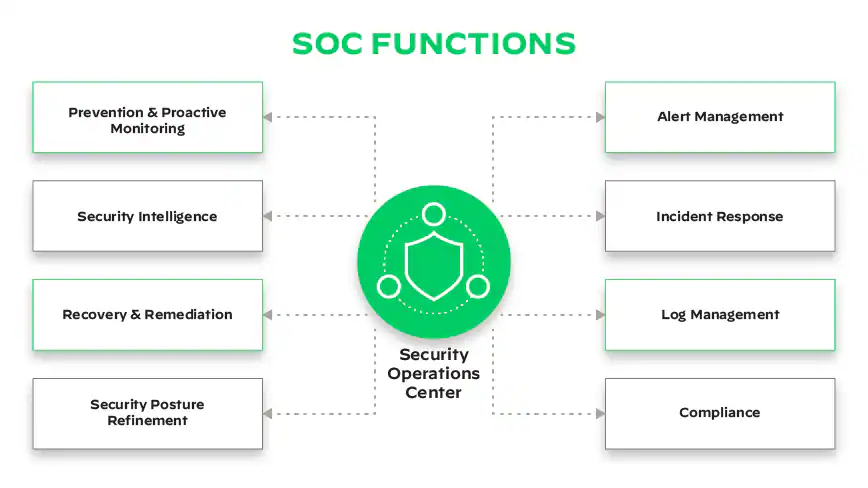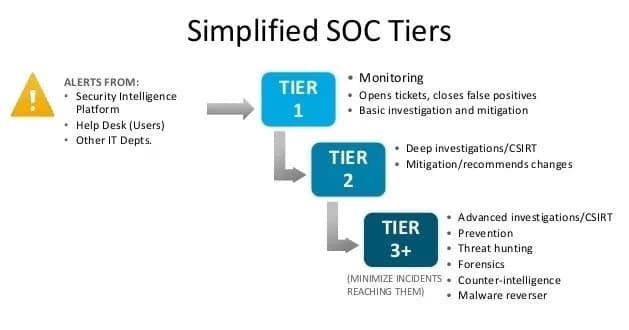The Role of a Security Operations Center Analyst in Cybersecurity
Cybersecurity professionals are in increasingly high demand as threats emerge that could compromise digital assets and networks, such as those within an Organization’s Security Operating Center (OSOC).
One crucial role within OSOC analysis is that of Security Operations Center Analyst.
In this article, we explore what SOC analysts do, certification requirements needed, the average salaries offered, and who best fits into this exciting profession.
What Is a Security Operations Center Analyst (SOC Analyst)?
A SOC Analyst serves as the frontline of defense against cyber threats. Working within a Security Operations Center environment, these professionals monitor network traffic, analyze security alerts, and respond to security incidents promptly – their primary responsibility is protecting and maintaining an organization’s information systems.
SOC analysts collaborate with various company departments, such as HR and sales, to maintain the security of their systems. If an employee in one of these departments experiences difficulty with their computer at work, resolving it falls to the SOC Analyst.

What Does a SOC Analyst Do?
A SOC Analyst plays an essential part in daily operations for any business. To better understand their duties and comprehend what defines a SOC Security Analyst, take a look at this list:
Monitoring Network Traffic
A SOC Analyst performs continuous network surveillance for any suspicious activities or potential security risks within an organization’s network by closely reviewing log files, data flow metrics, and other indicators of network health. For example, 3.4 million phishing emails are sent daily, and part of the SOC Analyst role will be discovering those threats.
Analyzing Security Alerts
Once an alert has been triggered, SOC analysts investigate its source and assess its severity using various tools and technologies to distinguish whether or not the incident represents a false alarm or an actual security incident.
Incident Response
Once an incident has been confirmed, SOC analysts take immediate steps to contain and mitigate damage, restore normal operations, and restore business as usual. This may involve isolating affected systems, applying patches, or working with other cybersecurity specialists on responding.
Documentation and Reporting
SOC analysts maintain extensive records of security incidents, their causes, and subsequent actions taken to address them. This documentation serves to conduct post-incident analyses as well as strengthen security measures.
Continuous Learning
Cybersecurity is an ever-evolving field with new threats surfacing constantly, so SOC analysts must remain up-to-date on current threats, tools, and best practices to effectively protect their organization’s assets.
There are typically three tiers of SOC Analysts, each with increasing responsibilities that align with qualifications and experience.
The following sections will discuss the certification and soft-skill requirements required to move through the SOC Analyst career ladder.

Aspiring SOC Analyst Certifications
Obtaining certifications that validate your skills is vital for a career as a SOC Analyst. They demonstrate them and can help set yourself apart in an increasingly competitive job market. Here are some highly sought-after certifications:
- CompTIA Security+: For beginners looking to dive deeper into cybersecurity topics, this entry-level certification is an ideal way to start learning the ropes.
- CompTIA Network+: These certifications position you as highly sought-after in network engineering.
- Certified Information Security Manager (CISM): CISM certification provides those interested in security management and governance with a means of distinguishing themselves in this industry.
- Certified Information Systems Auditor (CISA): This certification is ideal for professionals focused on information systems audit and control.
- Certified Ethical Hacker (CEH): As its name implies, this certification covers ethical hacking and penetration testing to gain insight into cybercriminal minds.
Cyber Brain Academy offers packages for these certifications to kickstart your career.
Salary Analysis for SOC Analysts
Salary estimates for SOC analysts can depend upon experience, location, and the size and industry of their employing organization. On average, analysts in the United States typically earn between $60K-100K each year, with entry-level positions starting lower while more experienced analysts can command higher wages.
SOC Analysts in Nevada, Virginia, and Maryland command the highest salaries in the US, according to Talent.com, with lower salaries in Rhode Island, Delaware, and Minnesota.
SOC Analysis provides an exhilarating career path brimming with opportunities. As businesses increasingly turn towards technology-based operations, the need for SOC Analysts has skyrocketed – leading to greater employment prospects in this dynamic profession and growth prospects in years ahead. Success lies in possessing the knowledge and hands-on experience needed to ascend the career ladder successfully.
With businesses increasingly shifting towards tech operations, there has been an explosion of demand for SOC Analysts tasked with protecting computer systems and sensitive data – giving this career choice immense promise in years ahead.

Are You an Ideal SOC Analyst Candidate?
Cybersecurity is an ever-evolving field, and being a SOC analyst presents its own set of challenges. Below are a few key traits and skills necessary for excelling at this role:
- Analytical Skills: SOC analysts need to sort through an abundance of data to detect threats, so a keen analytical mindset is necessary.
- Attention to Detail: Spotting subtle anomalies in network traffic may make all the difference between successfully combatting cyberattacks and being victims of one.
- Communication Skills: SOC analysts often need to communicate technical security issues to non-technical personnel, making effective communication necessary.
- Problem Solving: Cyber threats constantly shift and evolve, making problem-solving skills essential. Thinking on your feet and finding innovative solutions to security problems is invaluable.
- Stress Management: Cybersecurity can be an intensely challenging field, with constant potential security incidents. Being able to remain calm under pressure is an invaluable ability.
As previously discussed, the cybersecurity landscape is ever-evolving. SOC analysts must commit themselves to continual learning and skill acquisition.
Conclusion
SOC analysts play an essential role in safeguarding digital assets and networks. Their responsibilities involve monitoring, analyzing, and responding to security threats; prospective SOC analysts can distinguish themselves in the job market by earning relevant certifications such as those offered by Cyber Brain Academy. SOC analyst salaries tend to be competitive; they suit individuals with analytical abilities, an eye for detail, and a commitment to lifelong learning.
The field of cybersecurity awaits with open arms for those exploring a career as a SOC Analyst. Taking on this challenging role may present both exciting opportunities and daunting obstacles – so if this sounds like something that interests you, the journey awaits.








